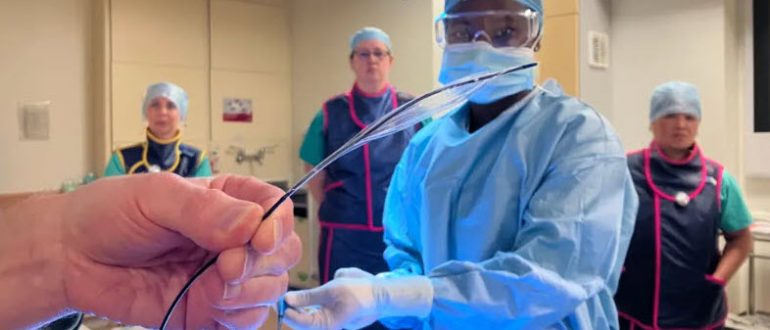The recent announcement that the Queen’s Medical Centre (QMC) in Nottingham has launched a 24/7 mechanical thrombectomy service marks a significant advancement in acute stroke care and represents a critical benchmark for the UK healthcare system.
Mechanical thrombectomy, a highly effective procedure for large vessel occlusion (LVO) ischemic strokes, has revolutionised treatment by physically removing the blood clot blocking blood flow to the brain, dramatically improving functional outcomes and reducing long-term disability. However, the efficacy of this time-sensitive procedure is directly tied to its availability, and the historic limitations of service hours in many UK hospitals have meant that stroke patients presenting ‘out-of-hours’ have not always been able to access this life-changing treatment.
Nottingham’s initiative directly addresses this inequity, ensuring that every severe stroke patient in their catchment area now has the same chance at a positive outcome, regardless of when their medical emergency occurs.
The establishment of a round-the-clock service requires considerable investment in specialist infrastructure, staffing, and coordinated care pathways. It mandates a robust multidisciplinary team, including interventional neurologists or radiologists, neuroanaesthetists and specialist nurses, available at all times.
By committing these resources, Nottingham’s QMC has demonstrated a profound understanding of the “time is brain” principle. For every minute of a large vessel occlusion, millions of neurons are lost, underscoring the urgency of reperfusion. Providing 24/7 access eliminates the critical delays that previously led to preventable disability and, in some cases, death. This move aligns with and advances the recommendations of national stroke guidelines, which consistently advocate for expanded access to thrombectomy services.
While Nottingham’s accomplishment is commendable, it also highlights a persistent disparity in access to advanced stroke care across the UK. For true health equity, this model of 24/7 mechanical thrombectomy provision must be replicated in all hospitals capable of treating stroke survivors. The postcode lottery of care, where a patient’s outcome is determined by geographical location and the time of their stroke, is medically and ethically indefensible.
For example, the shocking case of Graham McGowan highlights a critical failing within Scotland’s stroke services, demanding urgent intervention by the NHS and government. Doctors carried out a brain scan which revealed a blood clot and they advised he should be treated with a thrombectomy; a procedure to remove blood clots in a large artery. But, ARI’s closest specialist thrombectomy hub, in Ninewells Hospital in Dundee, only offers the procedure from Monday to Friday, leaving Graham, a fit and active 53-year-old, with severe and preventable disability simply because his stroke occurred outside of ‘office hours’.
Tackling this failure probably requires a multi-pronged approach: immediate investment to provide a genuine 24/7 national thrombectomy service with expanded hub hours. National bodies and hospital trusts across the UK should leverage the evidence from successful centres like QMC to develop actionable strategies for commissioning and implementing their own 24/7 services.
This would not only save more lives and reduce the national burden of long-term stroke-related disability but would also align the UK’s stroke care provision with the highest international standards. The commitment shown by Nottingham is a powerful example for others to follow, demonstrating that with strategic planning and investment, equitable access to best-practice stroke treatment is an achievable goal.



